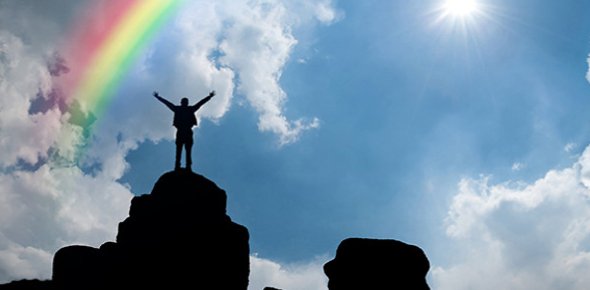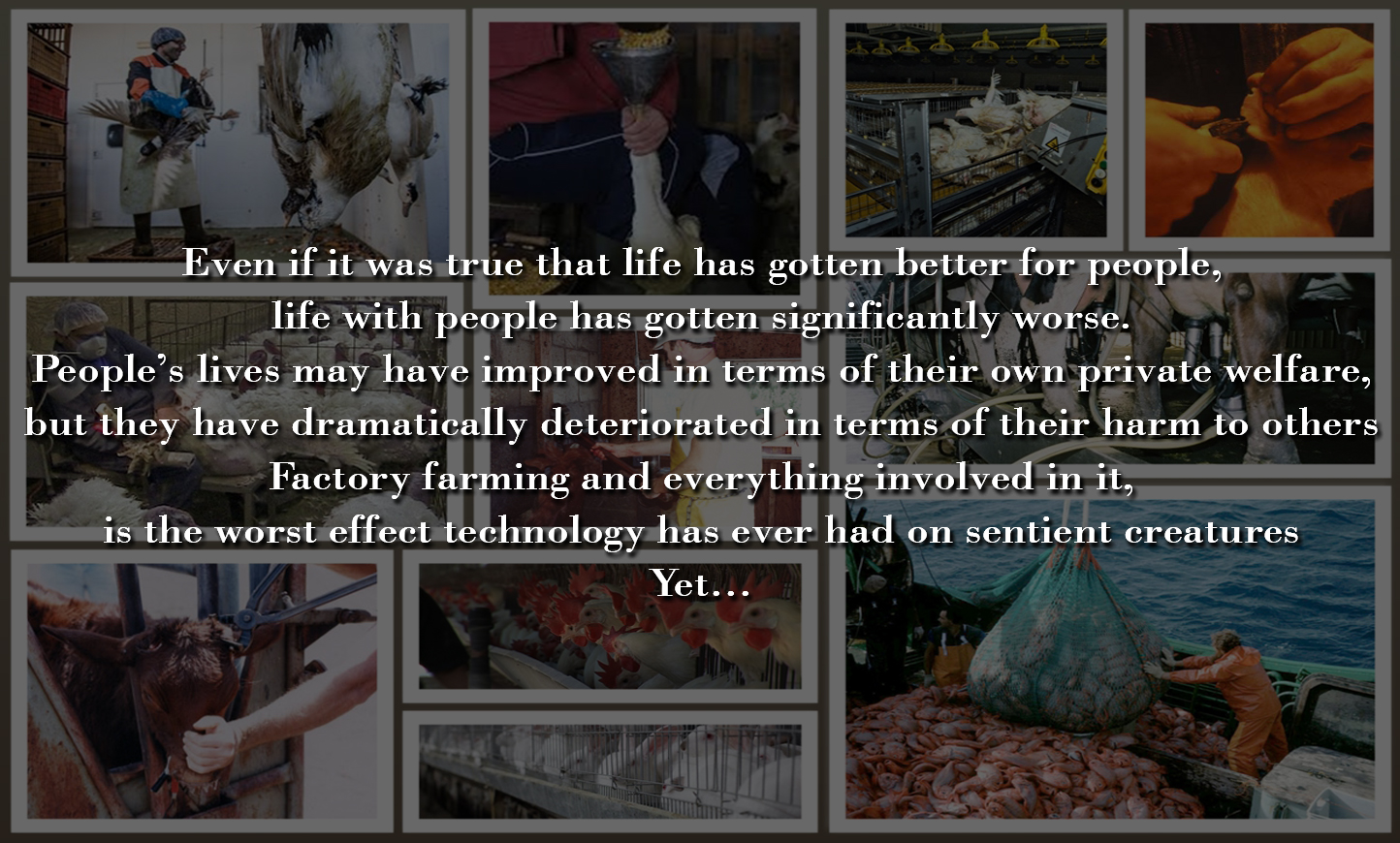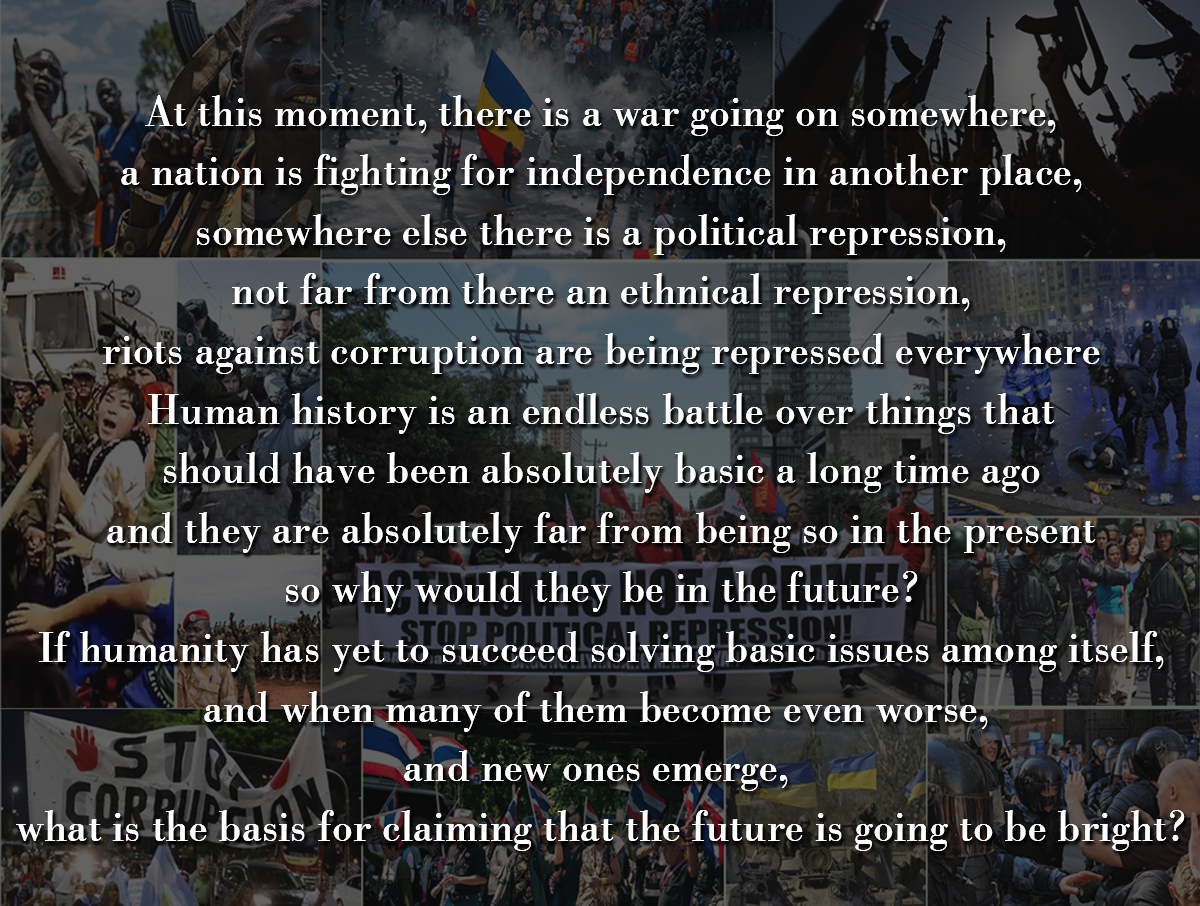
Some pro-natalists are claiming that humanity is evolving all the time and things are getting better all the time. Medicine had been extremely improved, people are less sick, they are eating better than they used to in the past, they are richer than ever, there is much higher awareness to hygiene and pollution, and the world is less violent. Humanity is constantly improving, so we just need to grit our teeth for a little longer, and life in the future would be much better.
This claim is simply wrong if we consider every aspect of living and of every sentient creature, and if we remember that what matters ethically is harms to actual living sentient creatures and not statistical probabilities of harms.
So first we need to ask, life is better for whom? The lives of most people have not been significantly improved due to the increase of wealth and technology. The gaps between rich and poor people, within and between nations, have only become wider. Billions of people are suffering daily from malnutrition if not hunger in the most literal and harsh sense of not having anything to eat. And that is despite the soaring technological advances in food production along the past century. Billions of people are suffering on a daily basis from lack of water or from using contaminated water, despite technological advances in water pumping, desalination and water purification. Billions of people are suffering on a daily basis from various curable diseases despite the soaring technological advances in medicine. Billions of people are suffering on a daily basis from pollution, filth, pain, violence, frustration and hopelessness. This is the reality of the majority of the human race. Advances and improvements in the fields of medicine, hygiene, food production, and technology, don’t reach most people.
And since the good aspects of technology didn’t benefit most people, clearly the major problems in this world are not technical but social and political. And these issues have not been solved and there is no reason to believe they will ever be solved.
The fact that it is much easier to produce food, to develop medicines, that there is much more awareness of clean water, clean air, green areas, hygiene and etc., yet all the problems are still here, is not an indication of improvement but the other way around. The technological potential didn’t prove itself for being able to solve these basic issues and in fact it made a lot of things a lot worse. The air, water and soil are much more polluted. People are eating food which is less nutritious, less natural, more chemically infected, and is produced using various harmful methods. Despite technological advancements people are forced to work longer hours. Despite the advancements in the entertainment business and platforms, with so many people having a smartphone connected to the internet in their pockets, they are much more bored. Instead of making people more connected and knowledgeable they are more ignorant, more divisive, more cynical, more alienated and less compassionate.
Some problems have gotten much worse, and some have only been created in modern time such as mass surveillance, cyberbullying, loss of privacy, algorithmic discrimination (amplification of racism, sexism, and other forms of discrimination by AI systems), shaming – online and otherwise, impulsive consumerism, drug abuse, anxiety, neuroticism, systematical dissatisfaction, lack of meaning, existential detachment, depression, loneliness and etc.
And last but definitely not least in this brief list of technology’s effects, is factory farming and everything involved in it , most probably the worst effect technology has ever had on sentient creatures. Yet.
Secondly, we need to remember that even if the claim that life is getting better was true, it is so in terms of ratio, not in absolute numbers. Meaning, maybe it is true that the chances of a person nowadays to be severely harmed by something (for example an infection caused by not much more than a flesh wound), compared with a few centuries ago, are lower; but since there are many more people in the world today there are many more people who are harmed by all kinds of things (even becoming severely ill from an infection caused by not much more than a flesh wound) than there were a few centuries ago.
It might be true that the chances of a person to fall victim to a violent attack are lower than they were in the past, but there are many more people who are victims of violent attacks because there are many more people today. And since it is absolute numbers that count, real actual people, not probabilities which are not morally relevant entities, the world is not getting better. It is less important ethically that statistically there is a lesser chance of someone to be harmed, and it is not an indication of the world becoming better as long as these odds don’t reflect a decrease in the total number of harmed people. There are more victims today of most of the harms, including ones that should have been eradicated long ago such as various easily treatable diseases, lack of food, and lack of clean water.
Victims of harms are what we must count and there are more of these than there were in the past.
Thinking that things have gotten better because they have gotten better statistically is thinking about humanity as an ethical entity instead of thinking about humans as ethical entities. It is thinking in relative terms and in patterns of the human race as a species instead of thinking about individuals of the human species which are the truly ethically relevant entities for that matter.
Also, this is a very Western thinking, as in many places the chances to be severely harmed, if to follow the previous examples, by an infection caused by not much more than flesh wound or by a violent attack, have not been significantly improved.
And most importantly for that matter, this is a very speciesist thinking as the chances of a nonhuman animal to be harmed by a violent attack nowadays is immensely higher than it was in the past. There are many more animals who are created specifically and especially to be harmed and then consumed by humans, than ever before. There are many more victims, and each is suffering much more than ever, since factory farms are way worse than hunting. So when considering every aspect of living and of every sentient creature, even if we’ll ignore the fact that this claim is falsely formulated, it is wrong on every aspect.
Thirdly, although it is true that when it comes to some aspects of life, the chances of a human individual to be harmed are lower than they used to be, the chances of a human individual to harm numerous others by numerous ways are higher than they used to be.
That is, first and foremost, because most people still choose to feed themselves in the most harmful ways. But even the ones who don’t, are forced to participate in various harmful methods bound with modern agriculture and with modern food production. But it is not just food, it is everything people are doing. Humans’ daily use of technology means harming others on a daily basis. It starts with mining relevant components for technology which is often done by human bondage, exploitation of poor areas, logging, land clearing, and heavy metal pollution; and continues with more use of energy, more CO2 emission, more oil leaks, more use of water, more pollution of water, more pollution of air and etc.
The amount of chemicals each person is using is enormous and surely is greater than ever before.
The amount of plastic each person is using is enormous and surely is greater than ever before.
There is no doubt that it is better for a person to have the option of changing clothes every day, and taking a shower every day, but like many other things, this is an advantage only in the human column, and a great disadvantage in the animals column. For animals, humans’ frequent washing and use of detergents, means less water in general, and less clean water in particular.
Life may be more convenient for many more people than they were in the past, but this is not the case for other creatures. There weren’t so many disposable products in the past. Not so many roads. Not so much artificial lighting. Not so much noise. Not so many fences and obstacles. Not so many poisons.
And the fact that humans live much longer nowadays, means each has a much longer period of harming others simply by living one’s life.
Each person, even if not directly or intentionally (for example by choosing a vegan diet and a minimalistic lifestyle), causes much more suffering and to many more sentient creatures nowadays. Even if it was true that life has gotten better for people, life with people has gotten significantly worse. People’s lives may have improved in terms of their own private welfare, but they have dramatically deteriorated in terms of their harm to others.
Fourthly, even if it was true that it is better in the present than it was in the past, better doesn’t necessarily mean good. Something can be better than something else yet be terrible in itself. The fact that things could have been worse, or if it is true that they have been worse, doesn’t mean that now they are good. If at all true, all this claim can stand for is that it is better in the present than it was, and that it is better in the present than it could have been, but not by any means that it is good in the present.
Fifthly, even if it was true that it is better in the present than it was in the past, there is absolutely no guarantee that it would be better in the future. It also might be a lot worse. And it already is a living hell.
At this moment, there is a war going on somewhere, a nation is crying out for independence in another place, somewhere else there is a political repression, not far from there an ethnical repression, right next to it religious repression, and riots against corruption are being violently hushed by the authorities everywhere. Human history is an endless battle over things that should have been absolutely basic a long time ago and they are absolutely far from being so in the present, so why would they be in the future? If the present is not significantly better than the past why assume that the future will be?
If humanity has yet to succeed solving basic issues among itself, and when many of them become even worse, and new ones have emerged, what is the basis for the assumption that the future is going to be bright? On what grounds do they assume that present violent conflicts would be solved in the future, and more importantly that new ones won’t constantly emerge?
Was there any reduction in the scope of weapon manufacture in recent years? In arms trade? In developing more lethal and destructive weapons? Did people stop fighting over territories? Over resources? Over religious differences? Did humanity become wiser and more educated and realized that it is totally insane to fight over the “right way” to worship a fictional entity? Did humanity become wiser and more educated and realized that profits are way less important than welfare? Did humanity become wiser and more educated regarding how to raise happy people? Did humanity become wiser and more educated and figured out the purpose of the whole thing? Can it provide a reasonable answer to the so fundamental self-evident and primary question – what is the meaning of life?
And lastly, even if it was true that the present is better than the past and that the future would be better than the present, what for? To what purpose? There is no aim to achieve in the future, there is no important goal to accomplish, and no one who is waiting to exist in the future, so what logical explanation let alone ethical justification is there to sacrifice generations upon generations of humans, and many more of nonhumans, so maybe a tiny fraction of all the sentient creatures who would be forced to be created theretofore would live in a supposedly better world? That is morally reprehensible in every possible respect.


Excellent! You have succinctly exploded the myth of “civilization” and “progress”.
All her points are hard hitting realities. The one that hits me the most is “Each person, even if not directly or intentionally (for example by choosing a vegan diet and a minimalistic lifestyle), causes much more suffering and to many more sentient creatures nowadays.” It’s our consumeristic lifeway, our predatory ethos, our speciesism, that even the vast majority of vegans hold, our maliciously ignorant harming that is earth’s out of sync killingway of all wild.